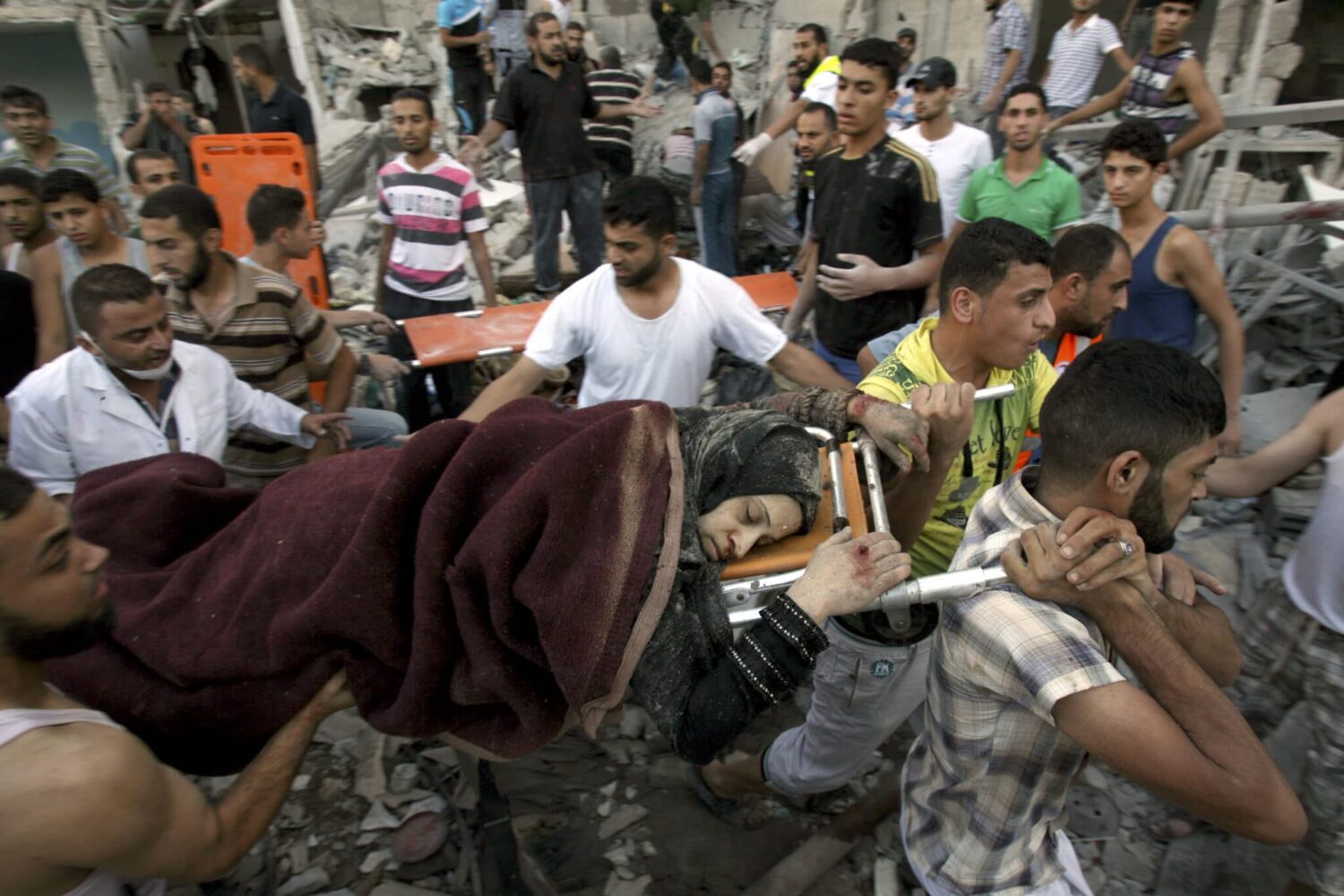
Beit Lahiya – July 30, 2014 – a Palestinian boy cries while receiving treatment for injuries caused by an Israeli strike at a U.N. school in Jebaliya refugee camp, northern Gaza Strip. A fierce debate is raging within Israel’s military over the extent to which soldiers should be held legally accountable for their actions during Gaza war(AP Photo/Khalil Hamra, File)Six years after the initial moves, in which international criminal justice was used as a political bargaining chip, Palestinian President Mahmoud Abbas finally signed the Rome Statute of the International Criminal Court (ICC) on 31 December 2014. What are the implications of Palestine’s membership in the ICC, and why was the retroactivity of the accession limited to crimes committed since 13 June 2014?
On 2 January 2015, the State of Palestine acceded to the Rome Statute by delivering in New York the documents on joining this and other international treaties and thus became the 123rd state to become a party to the ICC. Palestine is the fifth Arab state to place its citizens and territories under the jurisdiction of the ICC; the current Arab-state members are Jordan, 7 October 1998; Djibouti, 18 August 20116; the Comoros, 18 August 2006; and Tunisia, 24 June 2013, and Palestine. A day before the accession to the treaty, Abbas deposited a declaration with the Court’s registrar in The Hague, in which the State of Palestine accepted the jurisdiction of the ICC retroactive to 13 June 2014, which gave the Court the jurisdiction to begin its investigations of international crimes committed in Palestine since that date.
The main reason was the American-Israeli pressure that had been exerted on the Palestinian Authority since its first declaration, on 22 January 2009 (see the chronology). The Palestinian Authority was faced with American and European threats that it would lose the aid it had been receiving if it had chosen to seek ICC jurisdiction over alleged crimes committed by Israel against the Palestinians and their territory. Without a doubt, the Palestinian Authority was moving cautiously in its ratification of the Rome Statute after the adoption of resolution 67/19 on 29 November 2012, which elevated Palestine’s membership from “observer entity” to “non-member observer state,” with 138 “yes” votes, nine “no” votes, 41 abstentions, and 5 absences.
The outcome settled the question of whether or not Palestine is a “state” under international law and has enabled Palestine to join various international treaties, including the Rome Statute. The Palestinian Authority delayed the ratification of the Rome Statute because of Western diplomatic pressures that concluded with a European proposal in the UN Security Council to establish a Palestinian state, with Jerusalem as its capital, by 2017. However, the proposal was vetoed by the United States in mid-December 2014. This veto was the straw that the broke the camel’s back and led to the the Palestinian Authority’s firm decision to join the Hague Court.
According to the Palestinian chief negotiator, Saeb Erekat, this Palestinian action was a result of the American veto in the UN Security Council, which blocked a draft resolution to establish, by 2017, a Palestinian state with Jerusalem as its capital. The proposed resolution was voted down during the Security Council’s session held on 30 December 2014. While the Court welcomed Palestine’s accession to the Rome Statute, Israel and the United States were quick to respond with threats, the latter stating, through the State Department’s spokeswoman, Jen Psaki on 7 January 2015, that “The United States does not believe that the state of Palestine qualifies as a sovereign state and does not recognize it as such and does not believe that it is eligible to accede to the Rome Statute.” The United States threatened to suspend its annual aid of $440 million to the Palestinian people. Furthermore, the United States, which is not a member of the Court, like China, Russia, and India, and Israel, and which has veto power in the Security Council, called into question the Court’s legitimacy in the event that the Court approved Palestine’s accession to the Rome Statute.
The conditions for the Court’s jurisdiction
According to the Rome Statute, which is the treaty by which the ICC was established, the jurisdiction of the Court is subject to various conditions, classified as subject-matter jurisdiction, personal jurisdiction, and temporal jurisdiction. These conditions are specified in the by-laws of the Court. The ICC is unique in its permanence, international approach, and independence from the United Nations. Other UN-established courts are temporary, with jurisdiction limited to specific regions of the world, and are under the administration and supervision of the UN.
Based on the Rome Statute, the Court is unable to exercise its jurisdiction unless the crimes committed meet the specified conditions mentioned above. Temporal jurisdiction covers crimes that were committed after the establishment, on 1 July 2002, of the statute that created the Court (Article 11). Subject-matter jurisdiction covers the types of crimes that the Court is mandated to deal with, including such crimes as war crimes, crimes against humanity, genocide, and wars of aggression (Art. 5). Territorial jurisdiction refers to the location of the crimes committed. The alleged crimes must be committed within the territories of a member state of the Rome Statute (Art. 12, paragraph 1), or, in the alternative, the jurisdiction of the Court falls to a state that avails itself to the Court’s jurisdiction (Art. 12, para. 3). Furthermore, the UN Security Council may refer crimes to the Court based on a Security Council resolution (Art. 13-B).
Moreover, territorial jurisdiction can be exercised through personal jurisdiction. This occurs in a case in which a suspect in a criminal act being investigated is a citizen of a state where the Court has jurisdiction (Art. 12, para. 2b).
Why 13 June 2014?

According to Article 12, paragraph 3 of the Rome Statute, any state, whether or not a member in the ICC, may lodge a declaration with the registrar to indicate the time period during which the Court’s jurisdiction maybe exercised. However, the crimes may not have been committed before the effective date of the Rome Statute (1 July 2002). In the case that a state does not lodge a declaration with the Court’s registrar and chooses to ratify the Rome Statute, then the Court’s jurisdiction shall begin on the first day of the month, sixty days following the lodging with the UN General Assembly of the ratification of the Rome Statute (Art. 126). It is a mystery why the Palestinian Authority decided, according to the declaration lodged with the Court’s registrar on 1 January 2015, to restrict the dates of retroactive jurisdiction to 13 June 2014. Its previous declaration, under Article 12, paragraph 3, dated 22 January 2009, broadened the retroactive jurisdiction of the Court to 1 July 2002, which was the date that the Rome Statute came into effect.
What comes after ratification?
By ratifying the Rome Statute, Palestine gained membership in the General Assembly of the Member States of the Rome Statute. As such, it will have a permanent representative in the assembly and will have the right to vote during the annual meeting of the General Assembly, which observes the work of the Court and plays a role in its administration, budget, and any proposals to amend its articles and system. Additionally, Palestine has the right to demand that the office of the prosecutor investigate crimes that fall within the jurisdiction of the Court (Art. 13-A), whether such crimes were committed within or outside of Palestine’s territories. Palestine has the right to nominate its citizens to occupy important positions within the Court, including judges, heads of sections of the prosecutor’s office, various judicial sections, and the Court’s registrar. Palestine will also have the right to have its citizens employed by the Court in proportion to Palestine’s population.
By becoming a member of the ICC, Palestine has settled a long debate that was testing the patience of Palestinians. The main question is: Does the ICC have jurisdiction over crimes committed in Palestine? By ratifying the Rome Statute and giving the Court jurisdiction, the Court’s prosecutor is required to open investigations of crimes alleged to have been committed in Palestine since the 13 June 2014 and crimes that may take place in the future and fall within the subject-matter jurisdiction of the Court. Some of the crimes that might be carried out against the Palestinians and that are subject to the jurisdiction of the Court are: intentional murder; torture; destruction of property; deportation and illegal transfer; illegal detention; the targeting of civil structures and civilians; the targeting of peacekeepers and peacekeeping installations; genocide and the threat of genocide; pillaging; the use of chemical and other internationally banned weapons; degrading treatment; the starvation of civilians; sexual torture; rape; enforced disappearance; apartheid; war crimes; and crimes against humanity.
Once an investigation has been initiated, it will be followed by the issuance of summons or arrest warrants—in cases in which suspects decline to appear voluntarily—to those allegedly responsible for the commission of crimes in the Palestinian territories, regardless of their positions, citizenship, or level of immunity they enjoy. As it now stands, the Rome Statute does not recognize political or diplomatic immunity. The Court’s prosecutor has issued arrest warrants against former prime ministers, former and current ministers, and even a serving president in states that have experienced or are now experiencing armed conflicts in Africa. No non-African state has yet been subject to prosecution by the Court.
There is no doubt that this Palestinian step will move the Palestinian-Israeli conflict into the courts. Now that Palestine is a member of the Court, it can follow the work of the Court from within and through its official representative, rather than through occasional official visits. According to a source in the prosecutor’s office, an official investigation will probably be initiated during 2015, after a protracted preliminary analysis of the facts.


